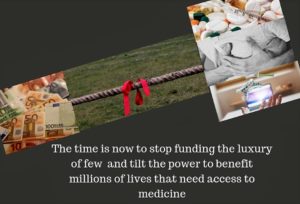Life versus Luxury
By Eunice Tolu Philip, Key Correspondent for the Irish Forum for Global Health
The 3rd annual Access to Medicine Ireland conference held at the Royal College of Surgeons on April 16th 2019, started off like most conferences, with the large auditorium, almost filled to its capacity, and the hum and buzzes of acquaintances and colleagues, setting the scene for the day.
The silence that ensues during professor Michael Barry’s keynote address however set the tone for the rest of the conference. There really is an issue! His mirroring of the conference theme ‘Affordability and Innovation’ to the health and wellbeing of the people and the economic impact of no access to medicine highlighted the iceberg, Ireland as country is facing.
It sounds inconceivable as he rolls out the figure, that in the “next five years, Ireland will spend at least 175 million euro on medication, with a budget impact per patient of over 37 million”. This is no over projection, but a lending from his expertise as the clinical director of the ‘National Centre for Pharmaeconomics’, to break down these figures. Also, his budget projection was not lost to the other conference speakers. Their recurring mention of the high price tag of medication, and its impact on access to needed medication by the public, highlighted both the economic and public health burden.
At what price tag will the tug tilt to favor the public’s health and wellbeing? what price will the 760,000 of Ireland’s 4.78 million population that lives below the poverty line pay, that will not leave them in intergenerational poverty? What is price tag of ensuring that the 230,000 children living in poverty have access to medicine? What price will be profitable enough for pharmaceutical industry’s luxury, without the country spending funds on feeding this luxury instead of social issues such as poverty and homelessness?
Bas Leerink, the committee chairperson for Netherlands report on ‘development of new medicines: better, faster, cheaper’ had this insight to some of these questions in his presentation. “We tackle the abuse of power” The power that pharmaceutical companies unashamedly paint as innovation. A value with marginal benefit to the public. For there is no value and no sustainability in paying top euros for innovation that is not accessible, affordable, and effective for all. It is tilting the tug towards luxury of few in exchange for life of many.
We can’t keep spending more money in an attempt to play catch-up with high prices of medication. “It is definitely not the right solution” according to Diarmaid McDonald of ‘Just Treatment UK’. One of his suggested solution of increasing the power of the buyer, echoes solution creation and ideas of other speakers as the conference. From Barry’s idea, that we only pay for medication that works, and get our money back when it does not, to Michele Tate’s advocating for open transparency to enable lower prices, and patient expert, Kay Curtin expressing the need to increase patient awareness to the depth of this issue, the tilt in favor of the public health was gaining momentum.
Despite this, it remains evident, that for Ireland, to fully tackle the issue of access to medicine that threatens to bankrupt her healthcare system, policy makers need to become more aware of the knock-off effect of the current high prices of medication on the health and economic stability of the country. There is no better time than now to stop funding the luxury of few and tilt the power to benefit millions of lives. Michele Tate puts it all in perspective in her closing statement. “Countries have nothing to lose… but the blindfolds”.
16 April 2019
CATEGORIES
- Restore Humanity Campaign
- Equity in Action Blog
- Training Programmes
- Sponsorship
- Vaccine Equity
- Get Global – Global Health Talks
- Student Outreach Team
- Get Global Young Professionals Talk Global Health
- Global Health Matters – Live Event Series
- Global Health Matters – IGHN Live Event Series
- An initiative of Irish Global Health Network
- ESTHER Ireland and ESTHER Alliance for Global Health Partnerships
- Global Health Matters – Webinar Series
- ESTHER
- IGHN Conferences
- Global Health Conference 2020
- Women in Global Health – Ireland Chapter
- ESTHER Partnerships
- Weekly Webinar Series
- 4th Global Forum on HRH
- Access to Medicines
- Archive Page Weekly COVID Webinars
- Clean Cooking 2019
- Climate Change and Health Conference 2017
- Conference Abstracts
- Conference Materials
- Covid FAQ
- COVID Funding Opportunities
- COVID-19
- COVID-19: Gender Resources
- Dashboard and online resources
- Education
- ESTHER Alliance
- Events
- Events & News
- Funding covid
- Global Health Exchange 2018
- Global Health Exchange 2019
- Global Health symposium 2019
- Health Workforce/HRH
- Homepage Featured
- Homepage recent posts
- IFGH 2011-2012 Conference and Events
- IFGH 2014 Conference
- IFGH Multimedia
- Irish AIDS Day 2017
- Irish News and Feeds
- Key Correspondent Articles
- Key Correspondent News
- Maternal Health
- Multimedia
- News
- News & Events
- Newsletter
- Opportunity
- Our LMIC's Resources for COVID19
- Partner Country News and Feeds
- Past Events
- Policy
- Presentations
- Recurring events
- Reports & Publications
- Research
- Resources
- Student Outreach Group
- Students Corner
- TEDTalks
- TRAINING COURSES FOR HEALTH CARE PROFESSIONALS
- Uncategorized
- Upcoming Events
RECENT POSTS

Impact testimonies- Lombani

Impact Testimony – Shadrick

Power, Inequality, Decolonisation – and Living My Recovery By Bronwyn April

Global Health Without Borders: Reflections on the Power of Diverse Voices

IGHNxEU – Empowering Women for a Healthier Europe


